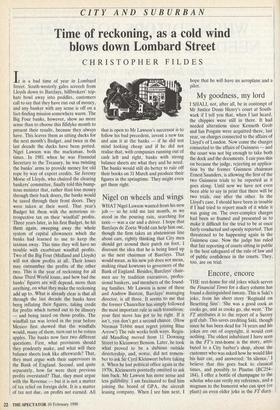CITY AND SUBURBAN
Time of reckoning, as a cold wind blows down Lombard Street
CHRISTOPHER FILDES
It is a bad time of year in Lombard Street. South-westerly gales screech from Lloyds down to Barclays, billbrokers' top- hats bowl away into puddles, customers call to say that they have run out of money, and any banker with any sense is off on a fact-finding mission somewhere warm. The Big Four banks, however, show no more sense than to choose this filldyke month to present their results, because they always have. This leaves them as sitting ducks for the next month's Budget, and twice in the last decade the ducks have been potted. Nigel Lawson was the marksman, both times. In 1981 when he was Financial Secretary to the Treasury, he was twisting the banks' arms to provide money for old rope by way of export credits. Sir Jeremy Morse of Lloyds, who chaired the clearing bankers' committee, finally told this bump- tious minister that, rather than lose money through their back doors, the banks would be taxed through their front doors. They were taken at their word. That year's Budget hit them with the notorious re- trospective tax on their 'windfall' profits. Three years later, in his first Budget, he hit them again, sweeping away the whole system of capital allowances which the banks had learned to use to keep the taxman away. This time they will have no trouble with exorbitant windfall profits. Two of the Big Four (Midland and Lloyds) will not show profits at all. Their losses may outnumber the profits of the other two. This is the year of reckoning for all those Third World loans, and how bad the banks' figures are will depend, more than anything, on what they make the reckoning add up to. What is already clear is that all through the last decade the banks have beei2 inflating their figures, taking credit for profits which turned out to be illusory — and being taxed on those profits. The windfall tax was levied in the year before Mexico first showed that the windfalls would, many of them, turn out to be rotten apples. The banks now face two different questions. First, what provisions should they prudently make, and what will their balance sheets look like afterwards? That, they must argue with their supervisors in the Bank of England. Second, and quite separately, how far were their previous profits overstated? That, they must argue with the Revenue — but it is not a matter of tax relief on foreign debt. It is a matter of tax not due, on profits not earned. All that is open to Mr Lawson's successor is to follow his had precedent, invent a new tax and aim it at the banks — if he did not mind looking cheap and if he did not realise that, with companies running out of cash left and right, banks with strong balance sheets are what they and he need. The banks would still do better to rule off their books on 31 March and produce their figures in the springtime. They might even get them right.


















































 Previous page
Previous page